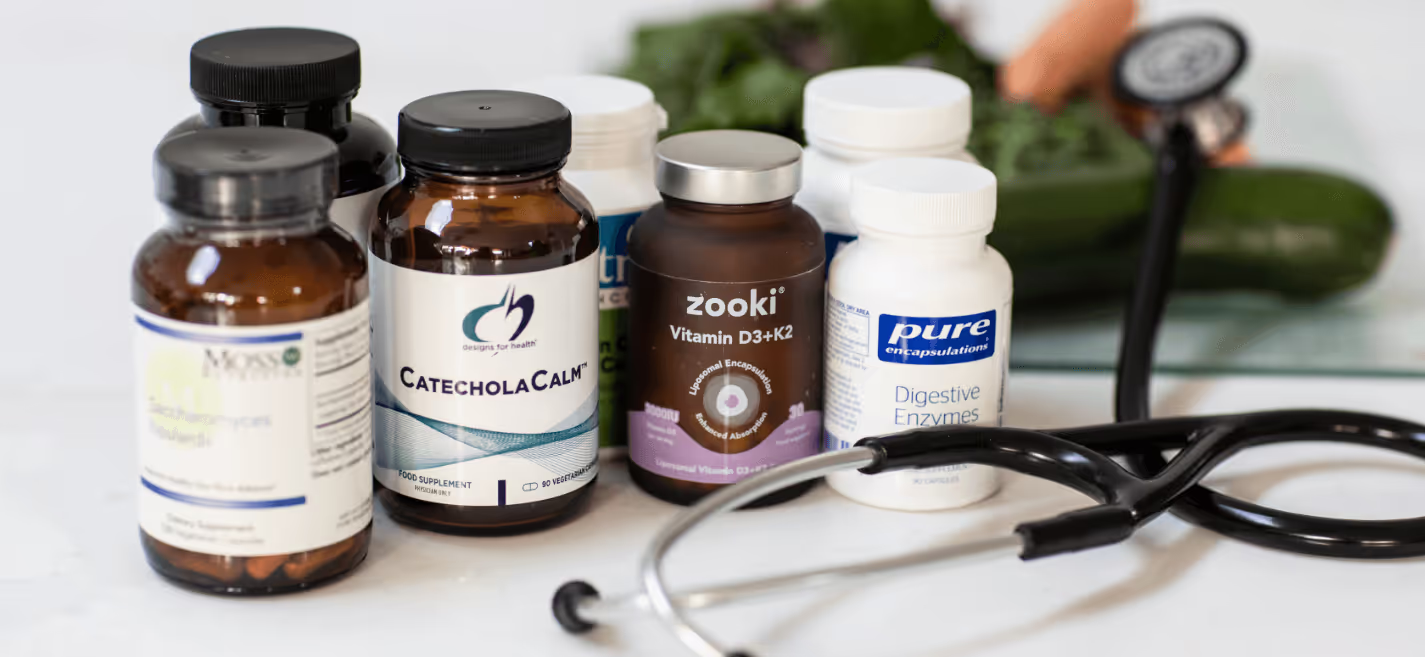
knowledge base: the blog
Understanding Leaky Gut Syndrome: A Patient's Guide


by Dr Nirusha Kumaran
September 13, 2025
What is Leaky Gut Syndrome?
Leaky gut syndrome, also known as intestinal hyperpermeability, is a condition in which the lining of the small intestine becomes damaged, allowing toxins, undigested food particles, and other substances to pass through the gut wall and into the bloodstream (Compare et al., 2024). This can lead to a range of symptoms and health problems.
Causes of Leaky Gut Syndrome
The exact causes of leaky gut syndrome are not fully understood; however, several factors are believed to contribute to its development. These include:
- Gut microbiome imbalance: An imbalance of the bacteria in the gut, also known as dysbiosis, can lead to inflammation and damage to the gut lining Mishra et al., 2025.
- Inflammatory bowel disease: Conditions such as Crohn's disease and ulcerative colitis can cause inflammation and damage to the gut lining, leading to leaky gut syndrome Vălean et al., 2024.
- Food intolerance: Food intolerances, such as lactose intolerance or gluten sensitivity, can cause inflammation and damage to the gut lining Awad et al., 2023.
- Stress: Chronic stress can cause inflammation and damage to the gut lining Inczefi et al., 2022.
- Medications: Certain medications, such as antibiotics and non-steroidal anti-inflammatory drugs (NSAIDs), can cause damage to the gut lining Twardowska et al., 2022.
Symptoms of Leaky Gut Syndrome
The symptoms of leaky gut syndrome can vary from person to person, but common symptoms include:
- Bloating and gas: Bloating and gas are common symptoms of leaky gut syndrome, as undigested food particles and toxins can cause inflammation and discomfort in the gut K Steinsvik et al., 2023.
- Abdominal pain: Abdominal pain and cramping are common symptoms of leaky gut syndrome, as the gut lining becomes inflamed and damaged (W Varni et al., 2023).
- Diarrhoea or constipation: Changes in bowel movements, such as diarrhoea or constipation, can occur as a result of leaky gut syndrome Francesca Bedeschi et al., 2025.
- Fatigue: Fatigue and lethargy can occur as a result of the body's immune system responding to the toxins and undigested food particles that have passed through the gut wall Inczefi et al., 2022.
Diagnosing Leaky Gut Syndrome
Diagnosing leaky gut syndrome can be challenging, as its symptoms are similar to those of other conditions. However, several tests can be used to diagnose leaky gut syndrome, including:
- Endoscopy: An endoscopy can be used to visually examine the gut lining and look for signs of damage or inflammation Min Hong & Hoon Baek, 2024.
- Blood tests: Blood tests can be used to detect signs of inflammation and immune system activation (Dalis et al., 2023).
- Stool tests: Stool tests can be used to detect signs of gut microbiome imbalance and inflammation (Yenew et al., 2023).
Treating Leaky Gut Syndrome
Treatment for leaky gut syndrome typically involves a combination of dietary changes, supplements, and stress management techniques. Some common treatments include:
- Dietary changes: Avoiding trigger foods, such as gluten and dairy, and increasing the intake of fibre and omega-3 fatty acids can help reduce inflammation and promote gut healing (Inczefi et al., 2022).
- Probiotics: Probiotics can help restore the balance of the gut microbiome and reduce inflammation Mishra et al., 2025.
- Stress management: Stress management techniques, such as meditation and yoga, can help reduce stress and promote gut healing (Inczefi et al., 2022).
Preventing Leaky Gut Syndrome
Preventing leaky gut syndrome involves maintaining a healthy gut microbiome and reducing gut inflammation. Some ways to prevent leaky gut syndrome include:
- Eating a balanced diet: Consuming a diet rich in fruits, vegetables, and whole grains can help promote a healthy gut microbiome (Inczefi et al., 2022).
- Managing stress: Techniques such as meditation and yoga can help reduce inflammation in the gut, as noted by Inczefi et al. (2022).
- Avoiding trigger foods: Refraining from consuming trigger foods, such as gluten and dairy, can help reduce gut inflammation (Inczefi et al., 2022).
By understanding the causes, symptoms, and treatment options for leaky gut syndrome, individuals can take steps to promote a healthy gut and reduce the risk of developing this condition.
References
Cited References:
Compare, D., Sgamato, C., Rocco, A., Coccoli, P., Ambrosio, C., & Nardone, G. (2024). The leaky gut and human diseases: "can't fill the cup if you don't plug the holes first".. Digestive Diseases (Basel, Switzerland). https://doi.org/10.1159/000540379
Mishra, S., Jain, S., Agadzi, B., & Yadav, H. (2025). A cascade of microbiota-leaky gut-inflammation- is it a key player in metabolic disorders?. Current Obesity Reports. https://doi.org/10.1007/s13679-025-00624-0
Vălean, D., Zaharie, R., Țaulean, R., Usatiuc, L., & Zaharie, F. (2024). Recent trends in non-invasive methods of diagnosis and evaluation of inflammatory bowel disease: a short review.. International Journal Of Molecular Sciences. https://doi.org/10.3390/ijms25042077
Awad, K., Barmeyer, C., Bojarski, C., Nagel, O., M Lee, I., R Schweiger, M., Schulzke, J., & Bücker, R. (2023). Epithelial barrier dysfunction in diarrhea-predominant irritable bowel syndrome (ibs-d) via downregulation of claudin-1.. Cells. https://doi.org/10.3390/cells12242846
Inczefi, O., Bacsur, P., Resál, T., Keresztes, C., & Molnár, T. (2022). The influence of nutrition on intestinal permeability and the microbiome in health and disease.. Frontiers In Nutrition. https://doi.org/10.3389/fnut.2022.718710
Twardowska, A., Makaro, A., Binienda, A., Fichna, J., & Salaga, M. (2022). Preventing bacterial translocation in patients with leaky gut syndrome: nutrition and pharmacological treatment options.. International Journal Of Molecular Sciences. https://doi.org/10.3390/ijms23063204
K Steinsvik, E., Hausken, T., Fluge, Ø., Mella, O., & Helge Gilja, O. (2023). Gastric dysmotility and gastrointestinal symptoms in myalgic encephalomyelitis/chronic fatigue syndrome.. Scandinavian Journal Of Gastroenterology. https://doi.org/10.1080/00365521.2023.2173533
W Varni, J., P Chumpitazi, B., Febo-Rodriguez, L., & J Shulman, R. (2023). Gastrointestinal symptoms profile in gastroparesis compared to other functional and organic gastrointestinal diseases.. Journal Of Pediatric Gastroenterology And Nutrition. https://doi.org/10.1097/MPG.0000000000003806
Francesca Bedeschi, M., Baldassarri, A., Villa, R., Tanzi, F., Salera, S., Lombardo, V., Draghi, A., Piazza O'Sed, N., Casazza, G., Vecchi, M., & Fraquelli, M. (2025). Phenotypical characterization of gastroenterological and metabolic manifestations in patients with williams-beuren syndrome.. American Journal Of Medical Genetics. Part A. https://doi.org/10.1002/ajmg.a.63993
Min Hong, S. & Hoon Baek, D. (2024). Diagnostic procedures for inflammatory bowel disease: laboratory, endoscopy, pathology, imaging, and beyond.. Diagnostics (Basel, Switzerland). https://doi.org/10.3390/diagnostics14131384
Dalis, C., M Mesfin, F., Manohar, K., Liu, J., Christopher Shelley, W., P Brokaw, J., & A Markel, T. (2023). Volatile organic compound assessment as a screening tool for early detection of gastrointestinal diseases.. Microorganisms. https://doi.org/10.3390/microorganisms11071822
Yenew, B., de Haas, P., Diriba, G., Kebede, A., Sherefdin, B., Demissie, Y., Bedru, A., Sahile, M., Mengesha, E., Gashu Dememew, Z., Tegegn, B., Slyzkyi, A., Amare, M., Getahun, M., Abdella, S., Jerene, D., & Tiemersma, E. (2023). Optimization of the simple one-step stool processing method to diagnose tuberculosis: evaluation of robustness and stool transport conditions for global implementation.. Microbiology Spectrum. https://doi.org/10.1128/spectrum.01171-23
Relevant but not cited:
Jain, S., Marotta, F., Haghshenas, L., & Yadav, H. (2023). Treating leaky syndrome in the over 65s: progress and challenges.. Clinical Interventions In Aging. https://doi.org/10.2147/CIA.S409801
Aguanno, D., Graziela Postal, B., Carrière, V., & Thenet, S. (2021). Use of ussing chambers to measure paracellular permeability to macromolecules in mouse intestine.. Methods In Molecular Biology (Clifton, N.J.). https://doi.org/10.1007/7651_2021_367
E Lacy, B., L Wise, J., & J Cangemi, D. (2024). Leaky gut syndrome: myths and management.. Gastroenterology & Hepatology. https://pubmed.ncbi.nlm.nih.gov/39193076
G Rogers, R., W Sung, V., S Lukacz, E., Fairchild, P., A Arya, L., D Barber, M., D Markland, A., Y Siddiqui, N., & M Bann, C. (2020). Accidental bowel leakage evaluation: a new patient-centered validated measure of accidental bowel leakage symptoms in women.. Diseases Of The Colon And Rectum. https://doi.org/10.1097/DCR.0000000000001596
Frieling, T., Gjini, B., Melchior, I., Euler, P., Kreysel, C., Kalde, S., Krummen, B., Kiesslich, R., & Hemmerlein, B. (2022). Endoscopic laser endomicroscopy and "leaky gut" in patients with functional gastrointestinal symptoms and food intolerance.. Zeitschrift Fur Gastroenterologie. https://doi.org/10.1055/a-1959-3200
Yohannes, A., Knievel, J., Lange, J., J Dormann, A., Hügle, U., F Eisenberger, C., & M Heiss, M. (2024). Vacstent as an innovative approach in the treatment of anastomotic insufficiencies and leakages in the gastrointestinal tract-review and outlook.. Life (Basel, Switzerland). https://doi.org/10.3390/life14070821
Talboom, K., G Greijdanus, N., van Workum, F., Ubels, S., Rosman, C., Hompes, R., Johannes H W de Wilt, J., & J Tanis, P. (2022). International expert opinion on optimal treatment of anastomotic leakage after rectal cancer resection: a case-vignette study.. International Journal Of Colorectal Disease. https://doi.org/10.1007/s00384-022-04240-5
Michela Chiarello, M., Fransvea, P., Cariati, M., James Adams, N., Bianchi, V., & Brisinda, G. (2022). Anastomotic leakage in colorectal cancer surgery.. Surgical Oncology. https://doi.org/10.1016/j.suronc.2022.101708
Reimer, S., F Lock, J., Flemming, S., Weich, A., Widder, A., Plaßmeier, L., Döring, A., Hering, I., K Hankir, M., Meining, A., Germer, C., Groneberg, K., & Seyfried, F. (2022). Endoscopic management of large leakages after upper gastrointestinal surgery.. Frontiers In Surgery. https://doi.org/10.3389/fsurg.2022.885244


Speaking Engagements
Are you searching for a speaker who offers unique perspectives on Functional and Longevity Medicine, hormone health, and the benefits of root-cause healing? Whether it’s a podcast, health summit, medical conference, or wellness panel, Dr Nirusha provides insightful, science-based talks that both inspire and educate.







